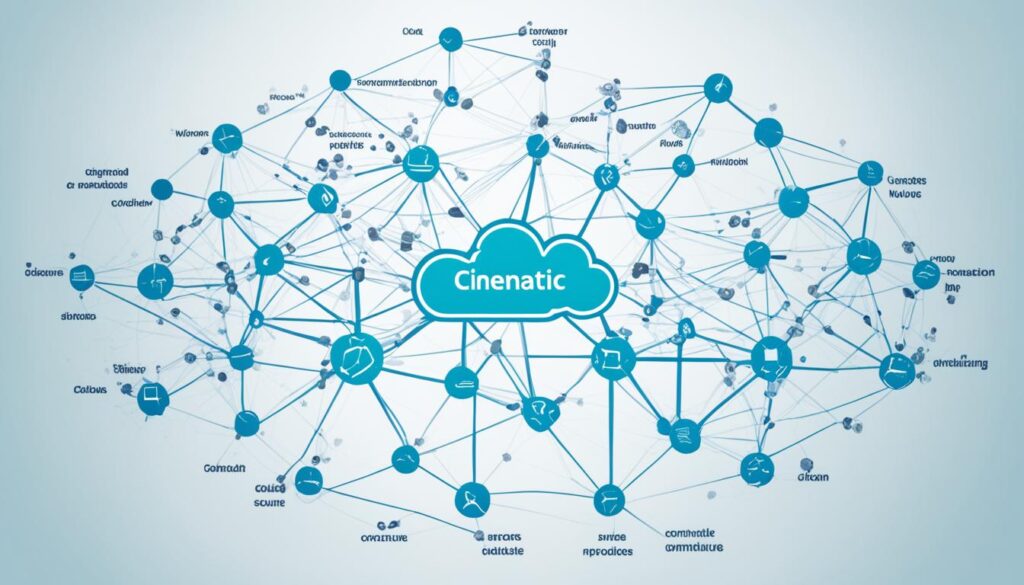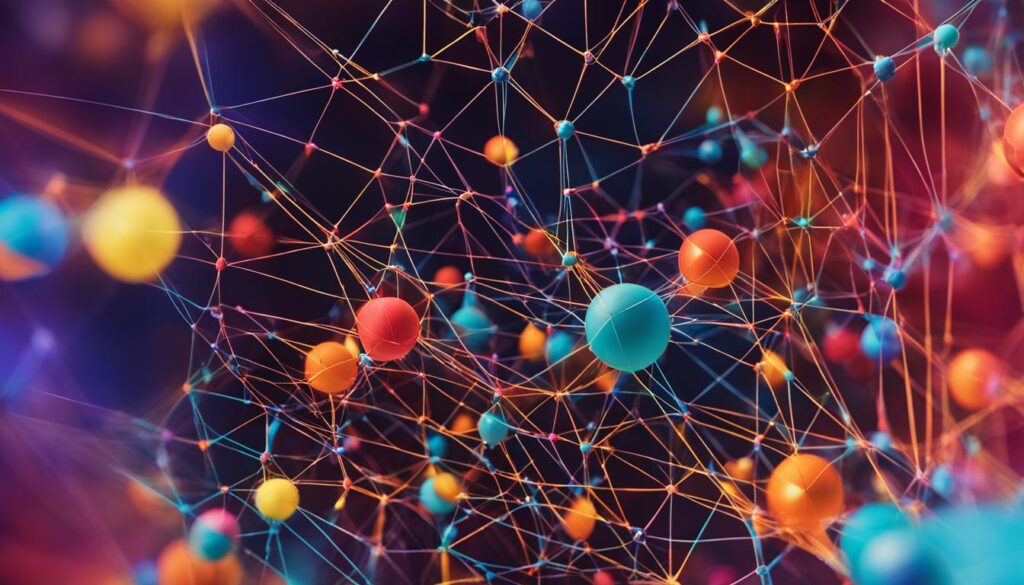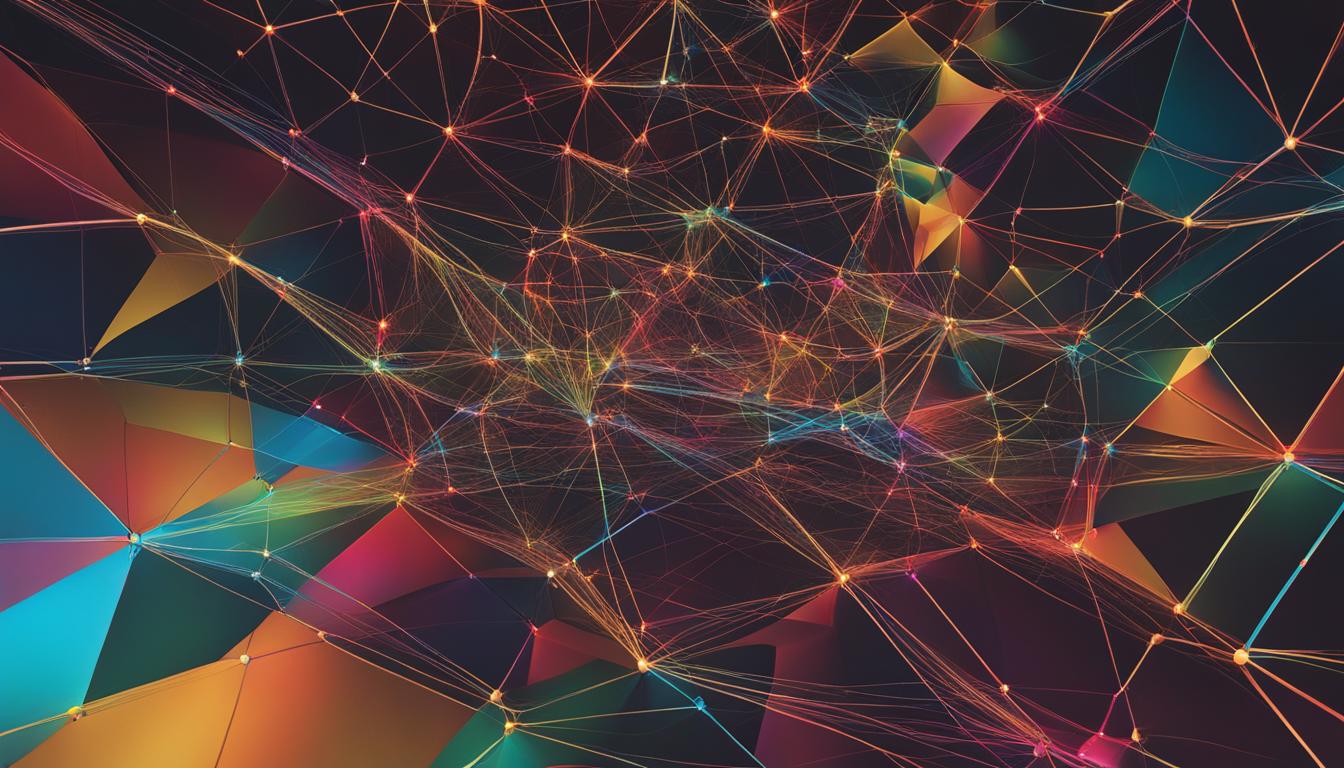Decentralized Autonomous Organizations (DAOs) are transforming the way we access and share knowledge. With the advent of blockchain technology, DAOs eliminate the need for centralized authority and pave the way for community-driven operations. This article dives into the power of DAOs in driving decentralized access to knowledge and information.
DAOs, also known as decentralized autonomous organizations, leverage blockchain technology to create a transparent and accountable system. Through this innovative approach, decision-making processes are conducted through a democratic and collaborative process. DAOs revolutionize traditional work platforms, placing the power of operation in the hands of the community.
Key Takeaways:
- DAOs leverage blockchain technology to enable decentralized access to knowledge and information.
- They eliminate the need for centralized authority and allow for community-driven operations.
- DAOs revolutionize traditional work platforms, empowering individuals and fostering collaboration.
- Decentralized knowledge sharing has the potential to reshape the future of information access.
- DAOs open up opportunities for a more inclusive and accessible knowledge economy.
What are DAOs?
Decentralized Autonomous Organizations (DAOs) are digital entities that operate without a centralized authority. They leverage blockchain technology to create a transparent and accountable system where decisions are made through a democratic process.
DAOs transform traditional work platforms by enabling community-driven operations and eliminating the need for intermediaries. Through DAOs, human collaboration takes center stage, allowing individuals to contribute to and shape the organization’s objectives and activities. By harnessing the power of blockchain technology, DAOs facilitate a secure and efficient framework for decentralized decision-making and project management.
“DAOs represent a paradigm shift in work platforms, fostering collaboration and innovation on a global scale. They serve as community-driven hubs for project management, knowledge sharing, and resource allocation. With DAOs, individuals have the opportunity to participate in and shape the future of work, creating a truly inclusive and empowering ecosystem.”
DAOs operate based on smart contracts, which are self-executing agreements implemented on the blockchain. These smart contracts automatically execute predefined rules and actions, ensuring transparency and eliminating the need for middlemen. Through the use of blockchain technology, DAOs provide an immutable and auditable record of all transactions and decision-making processes, enhancing accountability and trust within the organization.
Advantages of DAOs:
- Transparent and accountable decision-making process
- Elimination of intermediaries and associated costs
- Enhanced security and trust through blockchain technology
- Opportunity for global collaboration and diverse expertise
- Efficient resource allocation and project management
Limitations of DAOs:
- Learning curve for participants to understand and engage with DAOs
- Need for effective governance mechanisms to navigate complex decision-making
- Challenges in managing time and workload within a decentralized environment
- Potential security vulnerabilities and the need for robust safeguards
DAOs have the potential to revolutionize various industries by enabling community-driven operations, fostering innovation, and maximizing the collective intelligence of participants. They represent a fundamental shift in not only how organizations are structured and governed but also how individuals contribute to, collaborate within, and benefit from the decentralized knowledge economy.

The Motive of DAOs
The motive behind DAOs is to unleash global collaboration and pioneer the open economy revolution. These decentralized autonomous organizations empower individuals to contribute to a diverse range of knowledge-sharing activities, from work to education to gaming. By embracing the “x-to-earn” model, DAOs create endless opportunities for individuals to earn while participating in various activities, fostering a more inclusive and accessible knowledge economy.
DAOs revolutionize traditional models of collaboration by breaking down barriers and enabling global cooperation. They leverage blockchain technology to create decentralized networks where individuals from different backgrounds and locations can come together to share knowledge and expertise. This unleashing of global collaboration opens up new possibilities for creativity, innovation, and problem-solving.
One of the key advantages of DAOs is the open economy revolution they bring. Instead of relying on centralized institutions, DAOs allow for a more democratic and community-driven approach to economic activities. Through decentralized decision-making and transparent governance, individuals have the power to shape the future of the economy, free from the constraints of traditional systems.
Decentralized Knowledge Sharing
A significant aspect of the motive behind DAOs is decentralized knowledge sharing. These organizations provide platforms for individuals to share their expertise and insights with a global audience. By removing intermediaries and gatekeepers, DAOs empower individuals to directly contribute to the collective knowledge pool, fostering a culture of collaboration and learning.
Unlike traditional hierarchical structures, DAOs promote a sense of community and equality, where every voice is valued and heard. Through decentralized knowledge sharing, individuals can tap into a wealth of information and diverse perspectives, fueling innovation and driving progress in various fields.
DAOs empower individuals to contribute their unique knowledge and insights, fostering a collective intelligence that transcends geographical and cultural boundaries.
Community Empowerment
Another crucial aspect of the motive behind DAOs is community empowerment. These organizations provide individuals with the tools and resources to take control of their own destinies. By decentralizing power and decision-making, DAOs shift the balance towards inclusivity and equal opportunities.
Community members are empowered to participate actively, shape the direction of the organization, and contribute based on their skills and areas of expertise. DAOs create a sense of ownership and belonging, where individuals feel valued and empowered to make a difference.
Furthermore, DAOs enable individuals to earn income and rewards through their contributions. This “x-to-earn” model allows participants to monetize their skills, knowledge, and creativity, creating economic opportunities and financial independence.

In summary, the motive behind DAOs is to unleash global collaboration, revolutionize the economy, and empower communities. Through decentralized knowledge sharing and community empowerment, DAOs create new possibilities for innovation, creativity, and inclusivity. These organizations are at the forefront of the open economy revolution, paving the way for a future where individuals have the power to shape their own destinies and build a more inclusive and accessible knowledge economy.
Key Contributors to DAO’s Success
Several key contributors drive the success of decentralized autonomous organizations (DAOs). These contributors play crucial roles in shaping the future of DAOs and their impact on the knowledge economy.
1. Work-to-Earn: Dedicated innovators play a significant role in the success of DAOs. By relying on smart contracts and software, they create meaningful change within the ecosystem. These innovators actively participate in DAO projects and are rewarded for their work, fostering a Work-to-Earn culture.
2. Contribute-to-Earn: Freelance specialists with expertise in specific fields contribute their skills and knowledge to multiple DAOs. By sharing their expertise, they earn rewards and contribute to the growth and development of DAO projects. This Contribute-to-Earn approach allows specialists to leverage their talents across various decentralized networks.
3. Participate-to-Earn: Participants who actively engage in DAO activities and contribute to its growth are rewarded for their involvement. This incentive encourages individuals to actively participate in decision-making processes, community discussions, and other activities that drive the DAO forward. This Participate-to-Earn model fosters a sense of ownership and collaboration within the DAO ecosystem.
4. Play-to-Earn: DAOs also rewrite gaming norms by enabling players to earn rewards for their in-game achievements. Through the integration of blockchain technology, players are empowered to trade and monetize their in-game assets, creating new avenues for income generation. This Play-to-Earn model revolutionizes the gaming industry, allowing gamers to turn their passion into a profitable endeavor.
5. Learn-to-Earn: Knowledge acquisition becomes a paid activity within DAOs, creating a Learn-to-Earn approach. Individuals can earn rewards by contributing to educational initiatives, participating in online courses, or sharing their knowledge through decentralized platforms. This incentivizes lifelong learning and the sharing of valuable information within the DAO ecosystem.
6. Invest-to-Earn: Individuals also have the opportunity to invest in DAOs and earn through their engagement with decentralized networks. By investing their resources, whether it be capital, time, or expertise, individuals can contribute to the growth of DAOs and earn returns on their investments. This Invest-to-Earn approach allows individuals to actively participate in the decentralized economy and benefit from its growth.
The Diversity of Earning Models Within DAOs
DAOs offer diverse earning models, spanning from work, contribution, participation, gaming, learning, and investment. This diversity creates opportunities for individuals with various skill sets and interests to actively participate in the decentralized economy and collectively shape the future of knowledge sharing.
| Earning Model | Description |
|---|---|
| Work-to-Earn | Dedicated innovators rely on smart contracts and software to create meaningful change within DAOs. |
| Contribute-to-Earn | Freelance specialists with expertise in specific fields contribute their skills to multiple DAOs. |
| Participate-to-Earn | Active participants in DAO activities are rewarded for their engagement and contribution to the DAO’s growth. |
| Play-to-Earn | Gaming norms are rewritten, enabling players to earn rewards for their in-game achievements. |
| Learn-to-Earn | Knowledge acquisition becomes a paid activity, creating opportunities for individuals to earn while learning. |
| Invest-to-Earn | Individuals can invest in DAOs and earn returns through their engagement with decentralized networks. |
These different earning models within DAOs empower individuals to participate, contribute, and earn within the decentralized knowledge economy. As DAOs continue to evolve, these key contributors will shape the future of knowledge sharing, fostering a more inclusive and accessible global collaboration.
Advantages and Limitations of DAOs
Decentralized Autonomous Organizations (DAOs) offer numerous advantages that redefine traditional decision-making processes and foster innovation. By operating on a trustless ground, DAOs eliminate the need for centralized authorities and provide a secure environment for community-driven operations. Unlike traditional organizations, DAOs have an invincible workforce, as they cannot be shut down by external forces.
DAOs operate on open-source principles, promoting collaboration and driving innovation within their communities. This approach enables participants to contribute their expertise and ideas, creating a diverse and vibrant ecosystem.
However, DAOs also present certain limitations. Efficient decision-making processes are crucial for DAO success, as the absence of a central authority may result in delays or disagreements. Participants may face a learning curve when adapting to the decentralized nature of DAOs and the technological tools involved.
Furthermore, time management can be a challenge within DAOs, as participants need to balance their contributions with other personal and professional commitments. Additionally, security concerns, such as potential vulnerabilities in smart contracts and cybersecurity threats, need to be addressed to maintain the integrity of DAO operations.
DAOs offer a unique blend of trustless ground, invincible workforce, and open-source collaboration, revolutionizing decision-making speed and fostering innovation. However, addressing the learning curve, time management challenges, and security risks are vital for the continued growth and success of DAOs.

Advantages of DAOs:
- Trustless ground, eliminating the need for centralized authorities
- Invincible workforce, resistant to external shutdowns
- Open-source collaboration, driving innovation and creativity
- Enhanced decision-making speed through decentralized processes
Limitations of DAOs:
- Learning curve for participants to adapt to decentralized operations
- Time management challenges in balancing DAO participation with other commitments
- Security concerns related to smart contract vulnerabilities and cybersecurity threats
Conclusion
Decentralized autonomous organizations (DAOs) are revolutionizing the way we access and share knowledge in the digital age. By leveraging blockchain technology and community-driven operations, DAOs offer a transparent and inclusive platform for global collaboration. This shift towards decentralized access to knowledge and information holds immense potential for the future of knowledge sharing.
DAOs are reshaping traditional models of learning and sharing by eliminating the need for centralized authorities. Instead, participants have direct control over decision-making processes, ensuring a more democratic and inclusive approach. This decentralized approach empowers individuals from diverse backgrounds to contribute their skills, expertise, and perspectives, fostering a truly global collaboration.
The future of knowledge sharing lies in DAOs’ ability to create an inclusive economy. By embracing the principles of decentralization, DAOs open up new avenues for individuals to participate, contribute, and earn within the knowledge economy. Through DAOs, everyone has the opportunity to engage in meaningful work, acquire knowledge, and earn rewards, irrespective of geographical boundaries or traditional institutional barriers.
With decentralized access to knowledge and information through DAOs, we are entering a new era of global collaboration and an inclusive economy. By leveraging blockchain technology, DAOs are paving the way for a future where knowledge is freely accessible, empowering individuals to learn, share, and thrive in a rapidly evolving digital landscape.
FAQ
What are DAOs?
DAOs, or decentralized autonomous organizations, are digital entities that operate without a centralized authority. They leverage blockchain technology to create a transparent and accountable system, enabling community-driven operations and eliminating the need for intermediaries.
What is the motive behind DAOs?
The motive behind DAOs is to unleash global collaboration and pioneer the open economy revolution. DAOs empower individuals to contribute to a diverse range of knowledge-sharing activities, from work to education to gaming, creating a more inclusive and accessible knowledge economy.
Who are the key contributors to DAOs’ success?
The key contributors to DAOs’ success include dedicated innovators who rely on smart contracts and software to create meaningful change (Work-to-Earn), freelance specialists with expertise in specific fields contributing their skills to multiple DAOs (Contribute-to-Earn), participants who are rewarded for their engagement and contribution to the DAO’s growth (Participate-to-Earn), gamers earning rewards for their achievements (Play-to-Earn), individuals acquiring knowledge through a learn-to-earn approach (Learn-to-Earn), and individuals who invest in DAOs and earn through engagement with decentralized networks (Invest-to-Earn).
What are the advantages and limitations of DAOs?
DAOs offer advantages such as being built on trustless ground, resilience against external forces, and fostering collaboration and innovation through open-source principles. However, they also have limitations, such as the need for efficient decision-making processes, a learning curve for participants, time management challenges, and security concerns that need to be addressed.
How do DAOs drive decentralized access to knowledge and information?
DAOs leverage blockchain technology and community-driven operations to reshape how we learn and share knowledge. They offer a transparent and inclusive platform for global collaboration, paving the way for a more accessible and inclusive knowledge economy.








